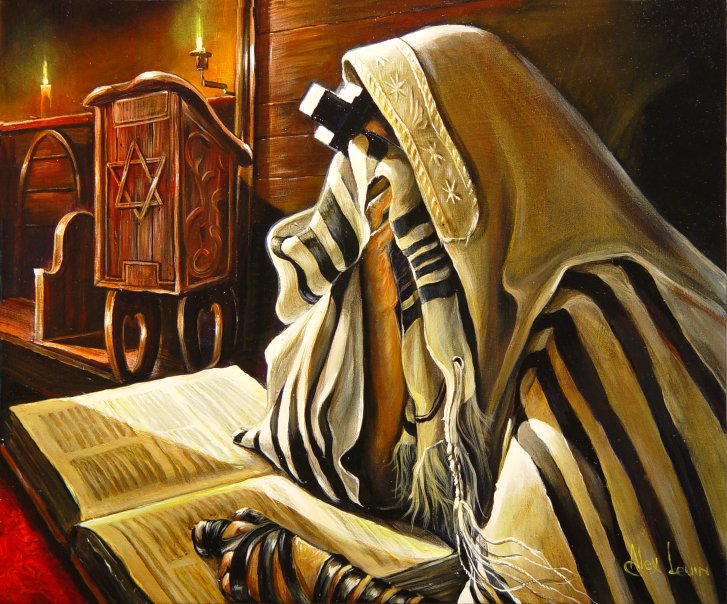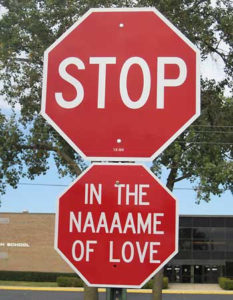
Raboyseyee and Ladies:
Mazel Tov again to Beth and Yehuda Honig on the weeding this past Monday of their son Josh to Natalie Wizman, she the daughter of Dailit and David Wizman of Los Angeles, CA.
Let’s Make a Deal:
Nu, believe it or not, the festive Yom Tov of Shovuis is looming, it’s around the corner mamish, and the counting of the sefira is almost over. So happens that bazman hazeh (in our times), and for reasons that remain somewhat inexplicable, there is kimat no real sefira observance. We seem to have forgotten all about Rebbe Akiva’s talmidim. Why? Ver veyst? Were they bad guys? Not too many years back, sefira observance entailed real mourning for the loss of his 24,000 students who were ‘amaylim ba’toirah’ (toiling in the folios of the heylige Toirah). Grada, the opening Rashi of this week’s parsha will tell us that we are instructed by the RBSO to be ‘amaylim ba’toirah, we will get to that soon. According to many but avada not all, they perished during these days. There was a time when no one dreamt of making a wedding or any other simcha during these weeks. We mamish felt for them and their families. The caterers and all other ancillary vendors were off on vacation. Ober business is business and when it comes to a potential ‘hefsed miruba’ (great monetary loss), in hyntige modernishe tzytin (in today’s modern society), such a loss avada trumps mourning. Moreover, being happy is avada preferred to being sad and shoin. The caterers, musicians, photographers, printers, party planners and badchonim mistama lobbied today’s rabbis and shoin. Suddenly, it’s ois sefira! Just two weeks ago the Oisvorfer was having an email exchange with a very choshova rabbi (prominent), who in response to the question of ‘what happened to sefira’ wrote azoy: sefira is thing of the past. Perhaps there is still some hope about eliminating the second day of Yom Tov, ver veyst. Today, people avada make weddings, bar mitzvah’s and other celebrations during the majority of the 49 day sefira period. They do so in the days immediately after Pesach and up to Roish Choidesh Iyar, on Roish Choidesh itself (both days), on Lag Bo’oimer and every day after. When all the exclusions are taken into account, strict sefira observance has been whittled down to under 21 days. Gishmak. And the way it’s been going, in a few more decades, sefira observance will be nothing but a memory.
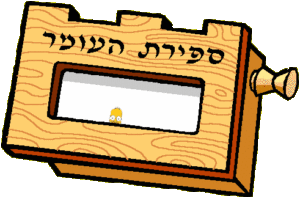 By this time next week, we will have begun the three days known as the ‘shloishes yimay hagbolo.’ The what? What are they? Nebech (sadly) to many of you, they are meaningless, mamish. Ober, way back in Toirah time, over in parshas Yisroy (Shmois 19) the Yiddin, fresh out of Mitzrayim and slavery, and unified as they arrived to Har Sinai, were instructed by the RBSO through Moishe, to get ready to receive the heylige Toirah. How did getting ready over in the midbar manifest itself? It’s not like they were busy doing anything else but counting the gold, silver and other goodies they permanently borrowed from their Egyptian neighbors. Let’s not forget the additional booty the sea spewed forth when the pursuing mitzrim drowned in the Yam Suf. Says the heylige Toirah (Shmois 19) azoy: beginning three days (according to most), but efsher four days according to Rebbe Yoise, and maybe also Moishe Rabaynu, they were to get ready by becoming ‘holy.’ And how did they go about becoming holy? Seemingly, they needed to wash their clothing (according to some) and efsher take a bath or ritual bath by immersing themselves in the mikveh (according to others), and, (according to all) they were specifically instructed to refrain from having sexual relations. Exactly where they found a mikveh -one for men and one for women- in the midbar, ver veyst, ober let’s recall that these were miraculous and magical times and if the RBSO davka wanted them to immerse in a mikveh, you can rest assured that a nice mikveh with all its amenities, suddenly appeared. Given the exact wording in the instructions, “a man shall not have sexual relations with a woman” it would appear that what the RBSO had in mind was not limited to a man and his wife, if you chap. Ober again, in hyntige tzeytin, we have forgotten about these three preparatory days. Seemingly, we are permitted to have relations with our wives, ober it would appear, that other women remain off limits. The heylige Gemora (Shabbis 86b) as brought down by Rashi (who else) avada explains why intercourse was verboten and goes into great detail about how long the sperm stays alive in the ‘oisoi mokom’ (vaginal canal), if you chap. Shoin, we will zicher get deep, if you chap, into that Rashi and learn pshat in how long zera (semen) stays alive and moves about, when parshas Yisroy next rolls around. In any event, we officially mark these three days as we do most of the other sefira days. On these days we are permitted to get fully sanctioned haircuts, and we are zicher permitted to make and attend yet more weddings and other celebratory affairs. In other words: we don’t mark them at all.
By this time next week, we will have begun the three days known as the ‘shloishes yimay hagbolo.’ The what? What are they? Nebech (sadly) to many of you, they are meaningless, mamish. Ober, way back in Toirah time, over in parshas Yisroy (Shmois 19) the Yiddin, fresh out of Mitzrayim and slavery, and unified as they arrived to Har Sinai, were instructed by the RBSO through Moishe, to get ready to receive the heylige Toirah. How did getting ready over in the midbar manifest itself? It’s not like they were busy doing anything else but counting the gold, silver and other goodies they permanently borrowed from their Egyptian neighbors. Let’s not forget the additional booty the sea spewed forth when the pursuing mitzrim drowned in the Yam Suf. Says the heylige Toirah (Shmois 19) azoy: beginning three days (according to most), but efsher four days according to Rebbe Yoise, and maybe also Moishe Rabaynu, they were to get ready by becoming ‘holy.’ And how did they go about becoming holy? Seemingly, they needed to wash their clothing (according to some) and efsher take a bath or ritual bath by immersing themselves in the mikveh (according to others), and, (according to all) they were specifically instructed to refrain from having sexual relations. Exactly where they found a mikveh -one for men and one for women- in the midbar, ver veyst, ober let’s recall that these were miraculous and magical times and if the RBSO davka wanted them to immerse in a mikveh, you can rest assured that a nice mikveh with all its amenities, suddenly appeared. Given the exact wording in the instructions, “a man shall not have sexual relations with a woman” it would appear that what the RBSO had in mind was not limited to a man and his wife, if you chap. Ober again, in hyntige tzeytin, we have forgotten about these three preparatory days. Seemingly, we are permitted to have relations with our wives, ober it would appear, that other women remain off limits. The heylige Gemora (Shabbis 86b) as brought down by Rashi (who else) avada explains why intercourse was verboten and goes into great detail about how long the sperm stays alive in the ‘oisoi mokom’ (vaginal canal), if you chap. Shoin, we will zicher get deep, if you chap, into that Rashi and learn pshat in how long zera (semen) stays alive and moves about, when parshas Yisroy next rolls around. In any event, we officially mark these three days as we do most of the other sefira days. On these days we are permitted to get fully sanctioned haircuts, and we are zicher permitted to make and attend yet more weddings and other celebratory affairs. In other words: we don’t mark them at all.
 Shoin, let’s take a quick look into the parsha. Or, maybe we shouldn’t. This week we have good and bad news to share. Let’s start with the bad: parshas Bchukoisai contains the ‘toichocho’ (admonitions, threats and curses) that the RBSO has in store for the Yiddin should they disobey His heylige Toirah and go off the derech (path). And as expected, the Yiddin did just that. Not once and not twice but many many times. Let’s avada recall that the Yiddin are referred to as an ‘aam kishay oiref’ (a stiff necked people), very stubborn. Being stiff, if you chap, taka got them into a heap of trouble as we will be learning in the parshas to come. And taka the RBSO meant what He said. He has, over the generations, made good and taka punished His chosen people severely. Yikes! A few rabbis have written that each and every curse has taka befallen the Yiddin. Shoin, lommer huffin (let’s taka hope) that those days are behind us.
Shoin, let’s take a quick look into the parsha. Or, maybe we shouldn’t. This week we have good and bad news to share. Let’s start with the bad: parshas Bchukoisai contains the ‘toichocho’ (admonitions, threats and curses) that the RBSO has in store for the Yiddin should they disobey His heylige Toirah and go off the derech (path). And as expected, the Yiddin did just that. Not once and not twice but many many times. Let’s avada recall that the Yiddin are referred to as an ‘aam kishay oiref’ (a stiff necked people), very stubborn. Being stiff, if you chap, taka got them into a heap of trouble as we will be learning in the parshas to come. And taka the RBSO meant what He said. He has, over the generations, made good and taka punished His chosen people severely. Yikes! A few rabbis have written that each and every curse has taka befallen the Yiddin. Shoin, lommer huffin (let’s taka hope) that those days are behind us.
Ober, what’s the good news? What can possibly be good about hearing all the horrific curses the RBSO promised to punish us with for our less then admirable behavior? The good news is azoy: Parshas Ki Sovoy found in Sefer Devorim (Deuteronomy) contains twice as many admonitions, threats and curses (98 to be specific). Moreover, they are seemingly harsher than the 49 delineated this week. Shoin! More good news: As we read the last few pisukim of the parsha, CHAZAK, CHAZAK, VINISCHAZAKE (be strong, be strong and let us be strengthened), we will be bidding adieu to sefer Vayikra (the book of Leviticus) for the sixth time, and will next week begin following the Yiddin and their travails as they valgered (trekked) through the midbar (desert) for forty years due to the sins of but 10 Yiddin, each a leader and an otherwise good guy. We will encounter a few very interesting characters and more, stay tuned.
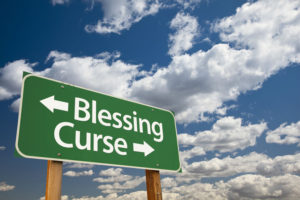 So happens that the Oisvorfer does not look forward to reviewing this parsha and is avada much happier when it’s read along with its -at times- sister parsha of Behar which we discussed just last week. And so that you have something intelligent to say at the shabbis tish, you should know that Bchukoisai is separated from Behar only during what we call an ‘iber yur’ (leap year) and this year is taka such a year. Ober is that always emes? Not! It so happens that Behar and Bchikoisai are separated even in non leap years over in Eretz Yisroel in years when the first day of Pesach falls on the heylige Shabbis. Got that? It’s a shtikel complicated ober if you happen to be planning a bar mitzvah over in Israeli during these weeks, you need to pay attention to the calendar lest your son ends up needlessly preparing both parshas and hating you for the rest of his life.
So happens that the Oisvorfer does not look forward to reviewing this parsha and is avada much happier when it’s read along with its -at times- sister parsha of Behar which we discussed just last week. And so that you have something intelligent to say at the shabbis tish, you should know that Bchukoisai is separated from Behar only during what we call an ‘iber yur’ (leap year) and this year is taka such a year. Ober is that always emes? Not! It so happens that Behar and Bchikoisai are separated even in non leap years over in Eretz Yisroel in years when the first day of Pesach falls on the heylige Shabbis. Got that? It’s a shtikel complicated ober if you happen to be planning a bar mitzvah over in Israeli during these weeks, you need to pay attention to the calendar lest your son ends up needlessly preparing both parshas and hating you for the rest of his life.
Accordingly….this year, instead of starting all over again with new medroshim, the Oisvorfer decided to follow the advice he gives his readers weekly: to look at the archives at www.oisvorfer.com. So happens that the first time this parsha was reviewed as a singleton, was way back in 2011, the first full year of the Oisvorfer’s givaldige reviews. In other words: we will repeat a few thoughts. Back then, the readership was still quite small, mistama under 25,000 in total, and it’s zicher the case therefore, that most of today’s readers (which are now mamish in the hundreds of thousands) did not read that shtikel. Shoin, this year, you will be reading a portion of what was penned or stroked five years back. As always, if a shtikel is being repeated, it is avada updated so that it looks brand new. It’s not! The heylige Toirah isn’t new either: grada its over 3000 years old, ober, we learn it over and again, daily and weekly. Shoin, lommer lernin.
Bchukoisai is a short parsha (8th shortest), ober it packs one hec of punch. Nu, while on the mundane…the Shlishi aliya (3rd) happens to be the longest in the gantze Toirah, and consists of a whopping 37 pissukim. Why one needs to know this, I’m not quite sure but it’s certainly more pleasant information than what awaits us as we read the RBSO’s warning to the Yiddin. It’s there that we find one of the most dramatic and harshest sections of the entire Toirah, a section known as the “toichocho”. What is it and why is it so frightening? Simply stated, it’s a series of increasingly horrible events that will take place if we are to chas v’sholom abandon the RBSO and His heylige Toirah. Disease, famine, war and exile in all of their gory details are enumerated. If your blood pressure hasn’t spiked yet, read on. Yikes!
WARNING:
If you’re an occasional bed wetter, have trouble falling asleep, suffer from nightmares and or any other sleep disorder, do not read this parsha. Raboyseyee: parshas Bchukoisei is not for the faint of heart.
This parsha is more well known for containing the toichocho (admonitions) than anything else contained in it (there is one other topic at the very end) and I’ve got news for you: they’re quite scary. And even though the toichocho found in this parsha is considered the “smaller” of the two found in the Toirah (the other, in parshas Ki Sovoi), it’s still not too pleasant to read and hear. Ober, it’s not the style of the Oisvorfer to skip over sections of the heylige Toirah. Hey- that’s what your Rebbe did in Yeshiva. Lehepech (the opposite): my job is to review and see if we can find a few hidden treasures in each parsha and lemayseh (in reality), usually we do. And with that givaldige introduction, let’s taka see what the parsha has in store for us.
This parsha could have easily been named ‘Let’s Make a Deal’ and taka that’s what the Yiddin are confronted with. The RBSO begins with these words: “If you follow my decrees and if you are careful to keep my commandments” (26:3), then good things will come your way. Note the double language of ‘if’ and ‘if’. Nu, it’s like this: if you follow the RBSO’s Chukim (decrees), all will be good: ober tomuh nisht (if not), all hell will break loose and you’re in big- no very big do-do. Shoin, got the picture?
Nu, to lure us in, the parsha begins with mamish a series of blessings that we will merit if we keep the Toirah. It’s only later, after we bought the ticket, that we are warned, quite graphically and sternly, of the calamities that will befall us if we do not. Among the brochois coming our way as a reward for being good Yiddin is a promise of rain in its proper time. The heylige gemorah (Taanis 2a) tells us that rain is the deepest of all mysteries, (along with giving birth and the raising of the dead). Its source is above even the highest of spiritual worlds and its secret rests solely in the hands of the Creator Himself. The medrish tells us that the proper time for rain is on Friday night because that’s when people are home and don’t have to go out to work. Nu, I ask you: would you prefer rain during the week when you can get into your car and drive to work and are otherwise busy anyway or would you prefer rain on weekends? I don’t know about the rest of my readers, but I prefer walking to and from shul on Friday nights without rain. Ver veyst? Then again, the medrish predates the industrial revolution.
A very famous Rashi, one that zicher you’ve heard repeated many times, or at least should have, stated that the reason the RBSO gave us double language in the first possik is because more is demanded of us than just following the laws of the heylige Toirah. And what might that be? Says Rashi: that we must be “Ameilim b’Toirah “, we must toil in Toirah. In other words: One must, if necessary, be prepared to eat bread with salt, drink water in small measure, sleep on the ground, live a life of deprivation – but must toil in the Toirah. So we learn in Pirkei Ovois (6:4). And the more than givaldige news is that by reading the Oisvorfer’s Toirah weekly, you are doing just that. You are learning, enjoying, laughing, discussing with chaverim (friends) and in general, toiling to chap every line and word. That’s what Rashi refers to by the words Ameilim, at least so I think.
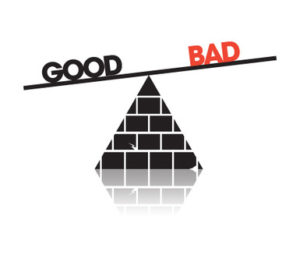 The Toichocho warns repeatedly that we will continue to suffer as long as we attribute our suffering to “keri” (chance) rather than to our sins. Exactly what that means, ver veyst.
The Toichocho warns repeatedly that we will continue to suffer as long as we attribute our suffering to “keri” (chance) rather than to our sins. Exactly what that means, ver veyst.
Back to Keri: The parsha makes it abundantly clear that many of the horrifying punishments enumerated are due to Keri אם תלכו עמי קרי – behaving casually with the RBSO. Which sin is explicitly described as an example of acting casually toward Him? You might have though it’s something big like having a casual fling ober (but) says the Shulchan Aruch that it’s forbidden to engage in work while one is reciting Birchas HaMozoin – bentching- (Grace After Meals). This too is Keri. The Mishnah Berurah writes that this prohibition includes not only a job which requires one’s attention and mental energy, but even a trivial task or looking into a book of Divrei Toirah. He adds that this prohibition is not limited to the recitation of bentching, and it applies to any blessing or prayer that a person is saying. The Chofetz Chaim explains that somebody who engages in other activities while he is blessing the RBSO is embodying the concept of אם תלכו עמי בקרי, as he is demonstrating a casualness and lack of respect toward mitzvois, for which the punishment is quite severe. Not that I’m belittling bentching, chas v’sholom (heaven forbid) but efsher taka (maybe) Keri means only little things.
I was also thinking about how tough the Yiddin were; what thick skinned people we are. Alternatively, what sinners they were. Despite all the dire warnings in this week’s parsha and again repeated later in Sefer Devorim, the Yiddin seemingly shook them all off. Isn’t it emes that throughout history, the Yiddin didn’t learn much of a lesson from these curses? They lost the Beis Hamikdash twice, were exiled from the land, and experienced innumerable other pogroms and massacres and yet the Yiddin continued to go about life without an accounting. Nu, who am I to give mussir? Anyway, the parsha is scary enough and the emes is that I don’t feel like talking about the gory details; instead we’ll look at a few factoids that pertain to the toichocho.
There was a time when no one wanted the dubious honor of being called to the Toirah to recite the brochois (blessings) before and after the Toichocho aliya: mistama they thought the parsha meant them specifically or that the Rabbi, Gabbai or head of the ritual committee was sending a message. Nu- in many shuls, this could taka be true. Way back in the 1920’s it was the minhag (custom) to have a pre-Bar Mitzvah bochur actually read this aliya. Today the minhag is to call the Ruv or the Gabbai, or the Baal Koirah himself to take this aliya. The toichocho is always contained within one aliya which begins and ends on cheerier notes, like the shmeer on the behind before the needle.
 Says the mishna in Megila (31A) that: “ein mafsikin be-klalois” literally, “we do not interrupt the [reading of the] curses.” This refers to the reading of the toichocho. The mishna teaches that we may not end an aliya in the middle of this section; the one who begins must complete it. And what’s the basis for this ruling? Of course there is more than one opinion and here they are. According to Rav Asi, someone who has read only part of the klalois (curses) and stops is avoiding rebuke, and that’s a no no. An individual who is sincere about his avoidas Hashem (serving the RBSO) should be only too happy to have someone point out how they are lacking and what can be done to improve himself. According to Resh Lakish the issue is about making a bracha on this reading. It seems out of place to be able to stand up and make the Birchas Hatoirah with enthusiasm before reading the harsh rebukes and warnings found in the pesukim of the toichocho.
Says the mishna in Megila (31A) that: “ein mafsikin be-klalois” literally, “we do not interrupt the [reading of the] curses.” This refers to the reading of the toichocho. The mishna teaches that we may not end an aliya in the middle of this section; the one who begins must complete it. And what’s the basis for this ruling? Of course there is more than one opinion and here they are. According to Rav Asi, someone who has read only part of the klalois (curses) and stops is avoiding rebuke, and that’s a no no. An individual who is sincere about his avoidas Hashem (serving the RBSO) should be only too happy to have someone point out how they are lacking and what can be done to improve himself. According to Resh Lakish the issue is about making a bracha on this reading. It seems out of place to be able to stand up and make the Birchas Hatoirah with enthusiasm before reading the harsh rebukes and warnings found in the pesukim of the toichocho.
Of course the gemorah asks: what’s the solution to the brocho issue and how do we fix it? Of course the gemorah almost always asks a question only when it has an answer and suggests azoy: that one should add a posik (or a few pesukim -see Toisfus) before and after the toichocho so that the brocho relates to them (the added pisukim) as well. In other words: they found an elegant fix for the issue.
Not everyone liked this idea and a new minhag sprang up in many shuls which entailed reading the toichocho portion without a brocho, i.e. the one who received the aliyah would make the final brocho before the toichocho and then the toichocho would be read without anyone having made a brocho beforehand. As expected, this minhag had its own difficulties and detractors and was eventually abandoned. Bazman hazeh (in our times) the person getting this choshovo aliya does in fact make the brocho’s but the baal koirah reads the toichocho portion in an undertone, barely audible in a larger or noisy shul. More on that in a moment.
Says the heylige Gemorah (31B) that this halacho evolved (according to one opinion) from a principle mentioned in Sefer Mishlei (3:11) that we should not “despise rebuke.” By bringing the aliya to a close before concluding the sharp words of admonition, one gives the impression that he attempts to avoid the continuation, that he has heard enough. Nu, can we taka blame him? Do you enjoy being admonished even by the eishes chayil, lectured and warned over and over? Shoin ginig (enough already)! Ober (but), Chazal (our sages) instituted that we must read the entire toichocho straight and uninterrupted to its completion, symbolic of the message that we must confront the bitter truth honestly, rather than trying to escape it. The fact that the curses of this section are very unpleasant to the ears, not to mention the heart, does not make it any less relevant to our lives; nor does it excuse us from carefully listening to and studying its harsh details.
All this got me thinking: if the RBSO wanted to warn us about what may lie ahead for the sinners and if the Mishna taka established that this reading is us critically important that we cannot make an hafsoko (stop), then why does the baal Koirah read them in a soft undertone so that barely anyone can hear him? Does this make sense to you? Wouldn’t you have imagined that someone should be yelling these out to us? Ver veyst?
Ok, veyter: Nu, another Gemora mistama you didn’t learn in yeshiva states (Kiddushin 39b) that שכר מצוה בהאי עלמא ליכא – the RBSO doesn’t give a person reward in this world for the mitzvois that he does. You mean we do all this davening, learning and all these mitzvois for naught? And if that’s the case, how can our parsha begin by stating that if the Yiddin study the Toirah and perform the mitzvois properly, that He will bless them in this world with rain and other goodies? Says the Rambam: that although somebody who properly performs the mitzvois will receive the blessings which are promised by the Toirah, these are not considered his full and primary reward. The primary reward is yet to come in the World to Come. Mamish givaldige. Incentive mamish!
Another brocho coming our way if we behave is that the RBSO will cause dangerous animals to cease from the land. Exactly what this means is avada also subject to a shtikel machloikes between Reb Yehudah who suggests that they will cease to exist mamish and Reb Shimon who says that they will continue to exist but their tendencies will have changed. Behavior modification efsher? Ver veyst.
A gitten Shabbis
The Oisvorfer Ruv
Yitz Grossman
